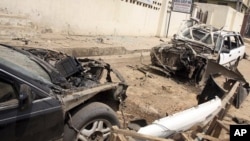As many as 30 civilians were killed in northern Nigeria Monday when Boko Haram militants attacked a market and then engaged in a gunfight with police. The incident could have a chilling effect on the willingness of locals to cooperate with authorities in the fight against the extremist Islamic sect.
Nigerian security forces have tightened security at a popular marketplace in the northeastern city of Maiduguri following an attack Monday by gunmen believed to be members of the extremist Islamic sect Boko Haram.
Revenge
The Nigerian military says it killed eight militants in an ensuing shoot-out, though Boko Haram said Tuesday that none of their members were killed.
A Boko Haram spokesman, known as Abu Qaqa, told journalists by phone that the group attacked the market in revenge for market traders turning in a suspected Boko Haram member to authorities last week.
Medical sources and traders say as many as 30 civilians were also killed in the crossfire, though the Nigerian military denies there were any civilian casualties.
Civilians
A trader in the market says that the militants attacked them with explosives and guns because market vendors helped capture one of their members last Thursday. Many innocent lives have been lost, he says, and they will not assist security forces in the future. He says they are calling on the government to salvage the situation because it is civilians who are on the receiving end of the violence now.
Senior Lecturer in Sociology at the University of Abuja, Abubakar Umar Kari, says Boko Haram has so far been successful in intimidating its opposition.
"The immediate effect is that ordinary people in Maiduguri and elsewhere are now going to be very, very afraid and very, very careful reporting the activities of the sect to the police because they can easily become targets," he said. "And security forces can do very little to protect them, even informants and other good Nigerians who are sick and tired of the activities of the sect."
Mistrust
The incident, he said, also reinforces existing mistrust between local residents and security forces.
"I don't know whether it is part of their training or because they do not follow rules of engagement," he added. "Nigerian security forces simply shoot indiscriminately whenever they are having a confrontation with armed groups."
A Nigeria researcher for Human Rights Watch, Eric Gutchuss, has been investigating abuses by security forces in response to Boko Haram attacks, including the raiding of communities and burning of homes suspected of harboring Boko Haram militants.
"The residents are in a tough position because they face threats from both sides," said Gutchuss. "One is from Boko Haram and the other is from the security forces. That is the key - for Nigerian security forces to scrumptiously adhere to human rights standards in response to these attacks because if not, that is exactly what these types of groups use, they use the abuses within communities or against suspected members as a recruitment tool and to justify further attacks. For the security services to be successful, they need the cooperation of the communities."
Attacks
Boko Haram wages almost daily attacks in the country's north against military and police targets, as well as churches and mosques. The central government in Abuja has struggled to control the security threat.
The group's name in the Hausa language means "Western education is a sin." It seeks to undermine state authority and calls for the stricter application of sharia, or Islamic law, in northern Nigeria.
HRW's Gutchuss says the activities of Boko Haram are, in part, a response to widespread corruption and impunity on the part of security forces and government elites.
Many argue that dialogue, and not military force, is needed to end the violence. However Boko Haram said told Tuesday that it would not enter into mediation until all of their arrested members have been released unconditionally.




